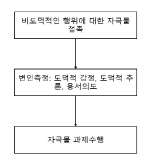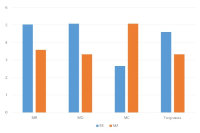PURPOSE This study examines how fitness centers’ care services affect the MZ generation’s perceived value, exercise attitude, and exercise commitment and how perceived value mediates this impact. METHODS Patrons aged 20–30 who used fitness centers in the Seoul and Gyeonggi regions participated in a questionnaire survey from January to February 2024, providing a total of 233 responses. Using SPSS 21.0 and AMOS 21.0, the data underwent frequency analysis, reliability analysis, confirmatory factor analysis, correlation analysis, and structural equation modeling. RESULTS First, perceived caring services had a significant effect on perceived value. Second, perceived value had a substantial influence on exercise attitude. Third, perceived value had no significant effect on exercise commitment. Fourth, exercise attitude significantly drives exercise commitment. Fifth, perceived caring services did not significantly affect exercise attitude or commitment. Sixth, perceived value fully mediates the relation between perceived caring services and exercise attitude. Seventh, perceived value had a full mediating effect on the association between perceived caring services and exercise commitment. Finally, tailored services and emotional support were identified as key factors in fostering MZ individuals’ positive exercise experiences and commitment. CONCLUSIONS Fitness centers should develop strategic services reflecting their customers’ goals and values to enhance their exercise attitudes and commitment and ultimately secure long-term customer loyalty.
PURPOSE This study aimed to present the measures necessary to perform well in tennis clubs by examining the adaptation process of the MZ generation participating in tennis clubs. METHODS A qualitative case study was performed and data was collected through in-depth interviews, direct observations, and literature surveys. The data were analyzed by applying pattern matching among the analysis methods proposed by Yin (2014), and the reliability and validity of the study were demonstrated by consultations between colleagues, reviewing members, and comparing and analyzing previous studies. The study participants were seven MZ generation tennis club participants selected through snowball sampling (one of the non-probability samples). RESULTS Achieving a level of skill that allows for compatibility and the effort required for it, the acceptance of differences in club culture and between generations, having the etiquette necessary for Generation MZ, and falling for the charm of tennis itself were identified as factors for successful participation in tennis clubs. CONCLUSIONS This study is expected to help the MZ generation, who have recently been interested in tennis, continue their participation, as well as lay a small foundation for the expansion of the base of the sport by detailing the measures necessary to successfully participate in tennis clubs.
PURPOSE The purpose of this study was to understand the current market trend for golf apparel rental services and to present basic data to revitalize the golf apparel rental service market and prepare continuous growth plans. METHODS The following keywords were selected for data collection: "golf wear + rental (렌탈)," "golf wear + rental (대여)," "golf apparel + rental (렌탈)," and "golf apparel + rental (대여).“ The analysis period was limited to two years and seven months from January 1, 2020 to July 31, 2022, when COVID-19 began. The analysis was focused on the top 60 keywords to simplify the network. RESULTS Various keywords were extracted through text mining, TF-IDF, connection centrality, emotional analysis, and semantic network analysis of big data analysis. These were then categorized into four factors: “golf apparel rental service,” “self-expression and authentication,” “sharing economy,” and “emotion.” CONCLUSIONS The results of this study show that young golfers are unreluctant and are generally positive in renting golf apparel. Therefore, if the growing paradigm of the consumption behavior of MZ-generation golfers is recognized and analyzed and the requirements are continuously satisfied through various strategies, there will be a higher possibility to help expand the golf apparel rental market.

Purpose Drawing on Socioemotional Selectivity Theory, the present research aims to investigate how sport consumers’ moral reasoning strategies and forgiveness intent toward a sport organization’s misconduct depending on the consumers’ different time perspectives(expansive vs. limited). Methods An experimental study (total n = 129; Baby Boomer generation = 62, generation MZ = 67) was conducted by utilizing a fictitious scenario depicting a sport organization’s misconduct. The proposed hypotheses were tested by conducting T-test, correction analysis, and multiple regression analysis using SPSS 21.0. Results There were significant differences in moral reasoning and forgiveness based on different time perspective. Baby Boomer(MZ) group showed higher(lower) levels of moral rationalization, moral decoupling, and intent of forgiveness compared to MZ(Baby Bommer) group, while showing lower(higher) level of moral coupling. A result also revealed that negative moral emotions had moderating effect between a limited time perspective and moral coupling among MZ participants. Conclusion The results of this study indicated that sport consumers’ time perspective has a predictive function on moral reasoning strategies. Thus, it is necessary for sport organizations to establish strategies focusing on the consumers’ time perspective to effectively respond to an unexpected crisis.



PURPOSE This study focuses on the experiences of novice tennis enthusiasts in Korea, aligning with the rising popularity of tennis as a burgeoning cultural phenomenon. METHODS Employing an ethnographic approach, we included eight participants with <5 years of tennis, in addition to three auxiliary participants. RESULTS The primary findings of this study are as follows: First, novice tennis players from the MZ generation actively employ tennis as a means of personal expression, sharing their tennis-related fashion and experiences on SNS. Second, most novice tennis players report a sense of detachment from the traditional club-centric tennis culture, gravitating toward casual court usage, spontaneous activities, and flexible membership structures. F inally, despite their modest technical proficiency, they avidly engage in knowledge-based consumption, displaying a profound grasp of tennis-related information. CONCLUSIONS These findings provide valuable insights into comprehending this burgeoning cultural phenomenon in Korean society, stemming from the escalating interest in tennis, and can serve as a valuable benchmark for establishing development strategies for tennis.